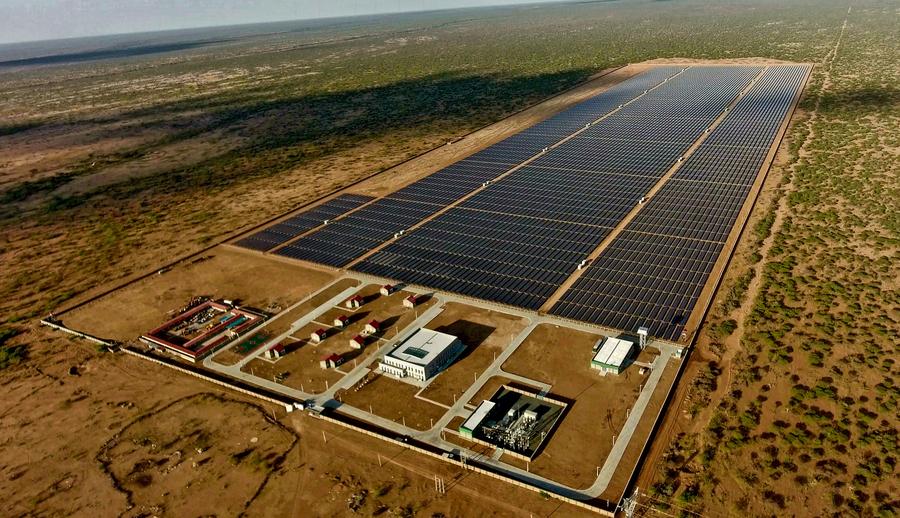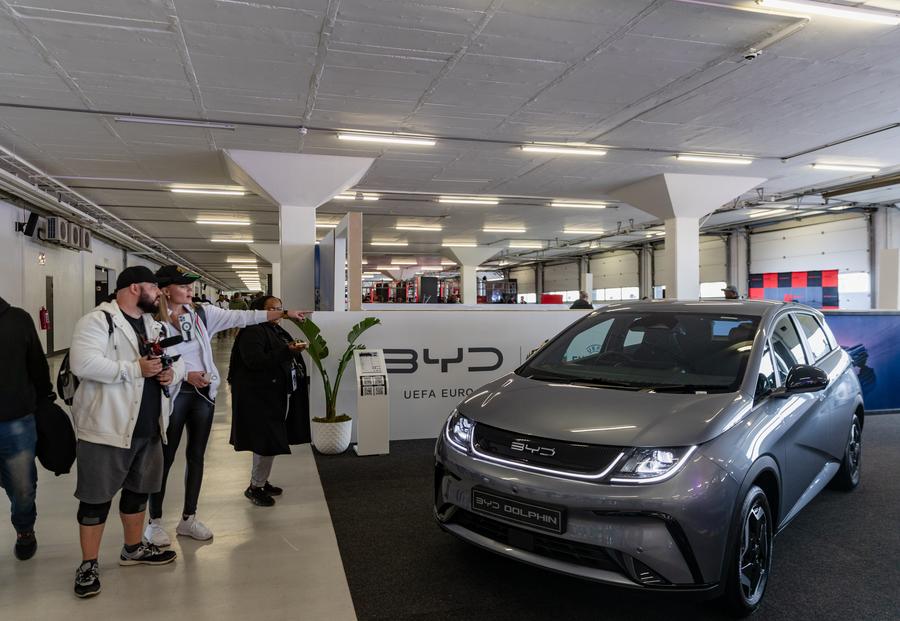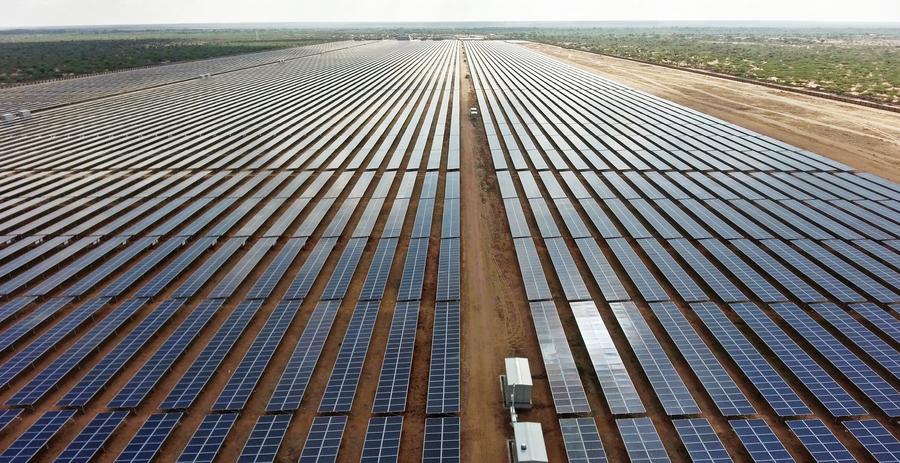(FOCAC)Explainer: What makes China and Africa natural green partners

A visitor tries an electric vehicle of BYD from China during the Festival of Motoring in Johannesburg, South Africa, Aug. 30, 2024. (Xinhua/Zhang Yudong)
Despite the West's continuous speculation of China's "overcapacity" in green industry, many Chinese NEV companies are driving an electric vehicle revolution in many parts of Africa, creating jobs and supporting a transition away from fossil fuels.
BEIJING, Sept. 3 (Xinhua) -- As China's green industry, particularly its new energy vehicle (NEV) sector, continues to thrive, Western politicians and media outlets have begun accusing China of "overcapacity," alleging it would threaten developing countries.
However, this baseless rhetoric has had little impact in Africa. Recognizing the significant benefits of Chinese green products, these nations have not only embraced them but also viewed them as a crucial way to address their development needs.
Why is the Western narrative of Chinese overcapacity failing to gain traction in Africa? Why are Chinese green products so popular across the continent? And what makes China and Africa natural green partners?

This aerial photo taken on Feb. 15, 2019 shows the Garissa Solar Power Plant in northeastern Kenya. (Xinhua)
CLEAN ENERGY PROVIDER
Energy shortage is a significant impediment to economic development in Africa. Although energy demand is growing across the continent, energy use per capita remains among the lowest in the world despite ample energy resources.
Africa consumes a disproportionately low amount of energy, accounting for less than 6 percent of global energy consumption despite hosting 18 percent of the world's population, according to a recent report by the Center for Strategic and International Studies.
When excluding South Africa, sub-Saharan Africa's per capita energy consumption is just 180 kilowatt-hours compared to 6,500 in Europe and 13,000 kilowatt-hours in the United States, the center said. Given Africa's rapidly growing population, it said there is an urgent need to increase the clean energy supply.
More than 600 million people on the continent currently lack access to electricity, according to the International Energy Agency. Against this backdrop, China's capacity for new energy products is hardly excessive; instead, it is a timely response to the urgent African demand for clean energy.
Africa has abundant hydro, solar, wind, geothermal, and bioenergy resources. However, Africa's current energy generation mix continues to rely on fossil fuels, while renewable sources account for less than 18 percent of the electricity output, according to German statistics platform Statista.
Africa faces a significant energy shortfall, particularly regarding clean energy. "The scale of what Africa needs to overcome her existential challenge is huge," said Charles Onunaiju, director of the Center for China Studies in Nigeria. "If you take the lens of the camera out of the glimmering cities and to the suburbs, you see that there is more to be done."
Despite the pressing demand for clean energy, change is underway across Africa. From Kenya's Garissa Solar Power Plant, the first large solar power plant tapping into the country's vast solar resources, to South Africa's De Aar Wind Farm, more than 100 green energy initiatives jointly led by China and Africa under the Forum on China-Africa Cooperation are bolstering the continent's green transition.
Zimbabwean economist Brains Muchemwa told Xinhua in a recent interview that Chinese new green energy products have significantly improved the lives of many Africans despite Western criticism of China's growing green industry production capacity.
At the first African Climate Summit in September 2023, China announced that it would launch an "Africa Solar Belt" program with 100 million yuan (about 14 million U.S. dollars) in funding for solar projects in regions not served by main electrical grids. The program aims to support at least 50,000 families.
By harnessing the abundant sunlight available in many African countries, Chinese projects have significantly increased the availability of clean and reliable electricity, particularly in remote and underserved areas, Benjamin Mgana, chief editor of foreign news at The Guardian newspaper in Tanzania, told Xinhua.

Visitors view an electric vehicle of BYD from China during the Festival of Motoring in Johannesburg, South Africa, Aug. 30, 2024. (Xinhua/Zhang Yudong)
AFFORDABLE GREEN SUPPLIER
Despite the West's continuous speculation of China's "overcapacity" in green industry, many Chinese NEV companies are driving an electric vehicle revolution in many parts of Africa, creating jobs and supporting a transition away from fossil fuels.
Kenya's startup BasiGo was the first company to launch electric buses in the country in March 2022, using parts designed by Chinese automaker BYD. Mutoro Sifuna, BasiGo's marketing director, emphasized the significant energy cost savings of electric buses compared with diesel ones. They plan to introduce and operate 1,000 electric buses by 2025.
The affordability and practicality of Chinese EVs make them appealing to African consumers, especially in urban areas where the demand for clean and efficient transportation is growing, said Mgana.
Adhere Cavince, a Kenya-based international relations scholar, echoed this view, highlighting that Chinese products are not only affordable and durable but also accessible. He emphasized that China's enhanced industrial value chains have made accessing these products easier for African consumers.
"As the largest source of green technologies and products, many African countries are now looking to China to access solar panels to power villages across the continent," he said.
The expert noted that Chinese companies have done sophisticated research on the needs, economic capabilities and opportunities of African consumers. This deepened insight has allowed them to tailor solutions that address consumer needs and expectations at the state, corporate and family levels.
This is evident in the success of Chinese companies in the electric motorcycle market in Africa. According to a recent report by Powering Renewable Energy, the African motorcycle market is expected to reach 5.07 billion dollars by 2027, with electric motorcycles becoming the dominant product in the transition to sustainable transport in sub-Saharan Africa.
ARC Ride, a start-up in Kenya, has based its R&D, assembly and sales locally, but some parts still need to be imported from China, India and Japan, with China providing the majority. Spiro Electric Vehicles, another major player in African electric vehicles, signed a strategic cooperation agreement with a Chinese company in 2023 to sell 500,000 electric motorcycles over the next five years, covering emerging markets such as Kenya and Uganda.

Aerial photo taken on Feb. 15, 2019 shows the China-financed solar power plant Garissa Solar in Garissa County, Kenya. (China Jiangxi Corporation for International Economic and Technical Cooperation/Handout via Xinhua)
DEVELOPMENT OPPORTUNITY
China has set the pace in international green cooperation with Africa, creating significant opportunities for African countries to advance sustainable development.
Over the years, China has implemented hundreds of projects to promote clean energy and green development on the continent. The installed capacity of photovoltaic power plants built by Chinese companies and Africa totaled over 1.5 gigawatts.
Mgana said China's expertise and investment in renewable energy technologies have provided African countries with the means to diversify their energy sources, reduce reliance on fossil fuels, and move towards more sustainable and environmentally friendly energy solutions. Such collaboration with China has paved the way for technology transfers, capacity building, and the creation of jobs in the renewable energy sector across Africa.
One example is Kenya's 55-megawatt Garissa Solar Power Plant, financed and constructed by Chinese firms. As the largest grid-connected solar power plant in East and Central Africa, it produces over 76 million kilowatt-hours annually, reducing carbon dioxide emissions by approximately 64,000 tons.
Moses Masika Wetangula, speaker of Kenya's National Assembly, said that with the power plant, Kenya has moved closer to achieving its clean energy transition goals.
"China's photovoltaic power station projects have made a substantial impact on solving local electricity problems in Africa," Mgana said. The photovoltaic projects have not only raised living standards by providing access to electricity but have also stimulated economic activity, he said.
The availability of stable electricity has enabled businesses to operate more efficiently, facilitated the development of local industries, and supported the growth of small and medium-sized enterprises, Mgana said. "Moreover, the reduction in energy costs and the reliance on diesel generators have lowered operational costs for businesses, making the local economy more competitive."
African countries are also eager to collaborate with China to develop their own NEV industry. Zambia and other African countries have benefited from China's support for green energy, said Johnstone Chikwanda, chairman of the Energy Institute of Zambia.
In the NEV industry, "China is a global leader and we are banking on China to learn the best practices," he said.
- China-Africa Practical Cooperation under the Belt and Road Initiative
- China, Netherlands pledge to build open world economy, strengthen green development cooperation
- Li Auto opens Munich R&D Center, advancing Sino-German NEV cooperation
- BMW surpasses 400,000 NEV deliveries in China
- China willing to build all-weather China-Africa community with shared future in new era -- FM


